- Home
- Lemony Snicket
The Ersatz Elevator
The Ersatz Elevator Read online
CHAPTER
One
The book you are holding in your two hands right now-assuming that you are, in fact, holding this book, and that you have only two hands--is one of two books in the world that will show you the difference between the word "nervous" and the word "anxious." The other book, of course, is the dictionary, and if I were you I would read that book instead.
Like this book, the dictionary shows you that the word "nervous" means "worried about something"--you might feel nervous, for instance, if you were served prune ice cream for dessert, because you would be worried that it would taste awful--whereas the word "anxious" means "troubled by disturbing suspense," which you might feel if you were served a live alligator for dessert, because you would be troubled by the disturbing suspense about whether you would eat your dessert or it would eat you. But unlike this book, the dictionary also discusses words that are far more pleasant to contemplate. The word "bubble" is in the dictionary, for instance, as is the word "peacock," the word "vacation," and the words "the" "author's" "execution" "has" "been" "canceled," which make up a sentence that is always pleasant to hear. So if you were to read the dictionary, rather than this book, you could skip the parts about "nervous" and "anxious" and read about things that wouldn't keep you up all night long, weeping and tearing out your hair.
But this book is not the dictionary, and if you were to skip the parts about "nervous" and "anxious" in this book, you would be skipping the most pleasant sections in the entire story. Nowhere in this book will you find the words "bubble," "peacock," "vacation," or, unfortunately for me, anything about an execution being canceled. Instead, I'm sorry to say, you will find the words "grief, "despair," and "woeful" as well as the phrases "dark passageway," "Count Olaf in disguise," and "the Baudelaire orphans were trapped," plus an assortment of miserable words and phrases that I cannot bring myself to write down. In short, reading a dictionary might make you feel nervous, because you would worry about finding it very boring, but reading this book will make you feel anxious, because you will be troubled by the disturbing suspense in which the Baudelaire orphans find themselves, and if I were you I would drop this book right out of your two or more hands and curl up with a dictionary instead, because all the miserable words I must use to describe these unfortunate events are about to reach your eyes.
"I imagine you must be nervous," Mr. Poe said. Mr. Poe was a banker who had been put in charge of the Baudelaire orphans following the death of their parents in a horrible fire. I am sorry to say that Mr. Poe had not done a very good job so far, and that the Baudelaires had learned that the only thing they could rely on with Mr. Poe was that he always had a cough. Sure enough, as soon as he finished his sentence, he took out his white handkerchief and coughed into it.
The flash of white cotton was practically the only thing the Baudelaire orphans could see. Violet, Klaus, and Sunny were standing with Mr. Poe in front of an enormous apartment building on Dark Avenue, a street in one of the fanciest districts in the city. Although Dark Avenue was just a few blocks away from where the Baudelaire mansion had been, the three children had never been in this neighborhood before, and they had assumed that the "dark" in Dark Avenue was simply a name and nothing more, the way a street named George Washington Boulevard does not necessarily indicate that George Washington lives there or the way Sixth Street has not been divided into six equal parts. But this afternoon the Baudelaires realized that Dark Avenue was more than a name. It was an appropriate description. Rather than street-lamps, placed at regular intervals along the sidewalk were enormous trees the likes of which the children had never seen before--and which they could scarcely see now. High above a thick and prickly trunk, the branches of the trees drooped down like laundry hung out to dry, spreading their wide, flat leaves out in every direction, like a low, leafy ceiling over the Baudelaires' heads. This ceiling blocked out all the light from above, so even though it was the middle of the afternoon, the street looked as dark as evening--if a bit greener. It was hardly a good way to make three orphans feel welcome as they approached their new home.
"You have nothing to be nervous about," Mr. Poe said, putting his handkerchief back in his pocket. "I realize some of your previous guardians have caused a little trouble, but I think Mr. and Mrs. Squalor will provide you with a proper home."
"We're not nervous," Violet said. "We're too anxious to be nervous."
"'Anxious' and 'nervous' mean the same thing," Mr. Poe said. "And what do you have to be anxious about, anyway?"
"Count Olaf, of course," Violet replied. Violet was fourteen, which made her the eldest Baudelaire child and the one who was most likely to speak up to adults. She was a superb inventor, and I am certain that if she had not been so anxious, she would have tied her hair up in a ribbon to keep it out of her eyes while she thought of an invention that could brighten up her surroundings.
"Count Olaf?" Mr. Poe said dismissively. "Don't worry about him. He'll never find you here."
The three children looked at one another and sighed. Count Olaf had been the first guardian Mr. Poe had found for the orphans, and he was a person as shady as Dark Avenue. He had one long eyebrow, a tattoo of an eye on his ankle, and two filthy hands that he hoped to use to snatch away the Baudelaire fortune that the orphans would inherit as soon as Violet came of age. The children had convinced Mr. Poe to remove them from Olaf's care, but since then the count had pursued them with a dogged determination, a phrase which here means "everywhere they went, thinking up treacherous schemes and wearing disguises to try to fool the three children."
"It's hard not to worry about Olaf," Klaus said, taking off his glasses to see if it was easier to look around the gloom without them, "because he has our compatriots in his clutches." Although Klaus, the middle Baudelaire, was only twelve, he had read so many books that he frequently used words like "compatriots," which is a fancy word for "friends." Klaus was referring to the Quagmire triplets, whom the Baudelaires had met while they were attending boarding school. Duncan Quagmire was a reporter, and was always writing down useful information in his notebook. Isadora Quagmire was a poet, and used her notebook to write poetry. The third triplet, Quigley, had died in a fire before the Baudelaire orphans had the opportunity to meet him, but the Baudelaires were certain that he would have been as good a friend as his siblings. Like the Baudelaires, the Quagmires were orphans, having lost their parents in the same fire that claimed their brother's life, and also like the Baudelaires, the Quagmires had been left an enormous fortune, in the form of the famous Quagmire sapphires, which were very rare and valuable jewels. But unlike the Baudelaires, they had not been able to escape Count Olaf's clutches. Just when the Quagmires had learned some terrible secret about Olaf, he had snatched them away, and since then the Baudelaires had been so worried that they had scarcely slept a wink. Whenever they closed their eyes, they saw only the long, black car that had whisked the Quagmires away, and they heard only the sound of their friends shrieking one fragment of the dreadful secret they had learned. "V.F.D.!" Duncan had screamed, just before the car raced away, and the Baudelaires tossed and turned, and worried for their friends, and wondered what in the world V.F.D. could stand for.
"You don't have to worry about the Quagmires, either," Mr. Poe said confidently. "At least, not for much longer. I don't know if you happened to read the Mulctuary Money Management newsletter, but I have some very good news about your friends."
"Gavu?" Sunny asked. Sunny was the youngest Baudelaire orphan, and the smallest, too. She was scarcely larger than a salami. This size was usual for her age, but she had four teeth that were larger and sharper than those of any other baby I have ever seen. Despite the maturity of her mouth, however, Sunny usually talked in a way most people found difficult
to understand. By "Gavu," for instance, she meant something along the lines of "The Quagmires have been found and rescued?" and Violet was quick to translate so Mr. Poe would understand. "Better than that," Mr. Poe said. "I have been promoted. I am now the bank's Vice President in Charge of Orphan Affairs. That means that I am in charge not only of your situation, but of the Quagmire situation as well. I promise you that I will concentrate a great deal of my energy on finding the Quagmires and returning them to safety, or my name isn't"--here Mr. Poe interrupted himself to cough once more into his handkerchief, and the Baudelaires waited patiently until he finished--"Poe. Now, as soon as I drop you off here I am taking a three-week helicopter ride to a mountain peak where the Quagmires may have been spotted. It will be very difficult to reach me during that time, as the helicopter has no phone, but I will call you as soon as I get back with your young pals. Now, can you see the number on this building? It's hard for me to tell if we're at the right place."
"I think it says 667," Klaus said, squinting in the dim green light.
"Then we're here," Mr. Poe said. "Mr. and Mrs. Squalor live in the penthouse apartment of 667 Dark Avenue. I think the door is here."
"No, it's over here," said a high, scratchy voice out of the darkness. The Baudelaires jumped a little in surprise, and turned to see a man wearing a hat with a wide brim and a coat that was much too big for him. The coat sleeves hung over his hands, covering them completely, and the brim of his hat covered most of his face. He was so difficult to see that it was no wonder that the children hadn't spotted him earlier. "Most of our visitors find it hard to spot the door," the man said. "That's why they hired a doorman."
"Well, I'm glad they did," Mr. Poe said. "My name is Poe, and I have an appointment with Mr. and Mrs. Squalor to drop off their new children."
"Oh, yes," the doorman said. "They told me you were coming. Come on in."
The doorman opened the door of the building and showed them inside to a room that was as dark as the street. Instead of lights, there were only a few candles placed on the floor, and the children could scarcely tell whether it was a large room or a small room they were standing in.
"My, it's dark in here," Mr. Poe said. "Why don't you ask your employers to bring in a good strong halogen lamp?"
"We can't," the doorman replied. "Right now, dark is in."
"In what?" Violet asked.
"Just 'in'," the doorman explained. "Around here, people decide whether something is in, which means it's stylish and appealing, or out, which means it's not. And it changes all the time. Why, just a couple of weeks ago, dark was out, and light was in, and you should have seen this neighborhood. You had to wear sunglasses all the time or you'd hurt your eyes."
"Dark is in, huh?" Mr. Poe said. "Wait until I tell my wife. In the meantime, could you show us where the elevator is? Mr. and Mrs. Squalor live in the penthouse apartment, and I don't want to walk all the way to the top floor."
"Well, I'm afraid you'll have to," the doorman said. "There's a pair of elevator doors right over there, but they won't be of any use to you."
"Is the elevator out of order?" Violet asked. "I'm very good with mechanical devices, and I'd be happy to take a look at it."
"That's a very kind and unusual offer," the doorman said. "But the elevator isn't out of order. It's just out. The neighborhood decided that elevators were out, so they had the elevator shut down. Stairs are in, though, so there's still a way to get to the penthouse. Let me show you."
The doorman led the way across the lobby, and the Baudelaire orphans peered up at a very long, curved staircase made of wood, with a metal banister that curved alongside. Every few steps, they could see, somebody had placed more candles, so the staircase looked like nothing more than curves of flickering lights, growing dimmer as the staircase went farther and farther up, until they could see nothing at all.
"I've never seen anything like this," Klaus said.
"It looks more like a cave than a staircase," Violet said.
"Pinse!" Sunny said, which meant something like "Or outer space!"
"It looks like a long walk to me," Mr. Poe said, frowning. He turned to the doorman. "How many floors up does this staircase go?"
The doorman's shoulders shrugged underneath his oversized coat. "I can't remember," he said. "I think it's forty-eight, but it might be eighty-four."
"I didn't know buildings could be that high," Klaus said.
"Well, whether it's forty-eight or eighty-four," Mr. Poe said, "I don't have time to walk you children all the way up. I'll miss my helicopter. You'll have to go up by yourselves, and tell Mr. and Mrs. Squalor that I send my regards."
"We have to walk up by ourselves?" Violet said.
"Just be glad you don't have any of your things with you," Mr. Poe said. "Mrs. Squalor said there was no reason to bring any of your old clothing, and I think it's because she wanted to save you the effort of dragging suitcases up all those stairs."
"You're not going to come with us?" Klaus asked.
"I simply don't have the time to accompany you," Mr. Poe said, "and that is that."
The Baudelaires looked at one another. The children knew, as I'm sure you know, that there is usually no reason to be afraid of the dark, but even if you are not particularly afraid of something, you might not want to get near it, and the orphans were a bit nervous about climbing all the way up to the penthouse without an adult walking beside them.
"If you're afraid of the dark," Mr. Poe said, "I suppose I could delay my search for the Quagmires, and take you to your new guardians."
"No, no," Klaus said quickly. "We're not afraid of the dark, and finding the Quagmires is much more important."
"Obog," Sunny said doubtfully. "Just try to crawl as long as you can," Violet said to her sister, "and then Klaus and I will take turns carrying you. Good-bye, Mr. Poe."
"Good-bye, children," Mr. Poe said. "If there's any problem, remember you can always contact me or any of my associates at Mulctuary Money Management--at least, as soon as I get off the helicopter."
"There's one good thing about this staircase," the doorman joked, starting to walk Mr. Poe back to the front door. "It's all uphill from here."
The Baudelaire orphans listened to the doorman's chuckles as he disappeared into the darkness, and they walked up the first few steps. As I'm sure you know, the expression "It's all uphill from here" has nothing to do with walking up stairs--it merely means that things will get better in the future. The children had understood the joke, but they were too anxious to laugh. They were anxious about Count Olaf, who might find them any minute. They were anxious about the Quagmire triplets, whom they might never see again. And now, as they began to walk up the candlelit stairway, they were anxious about their new guardians. They tried to imagine what sort of people would live on such a dark street, in such a dark building, and at the top of either forty-eight or eighty-four flights of very dark stairs. They found it difficult to believe that things would get better in the future when they lived in such gloomy and poorly lit surroundings. Even though a long, upward climb awaited them, as the Baudelaire orphans started walking into the darkness, they were too anxious to believe it was all uphill from here.
CHAPTER
Two
In order to get a better sense of exactly how the Baudelaire orphans felt as they began the grueling journey up the stairs to Mr. and Mrs. Squalor's penthouse apartment, you might find it useful to close your eyes as you read this chapter, because the light was so dim from the small candles on the ground that it felt as if their eyes were closed even when they were looking as hard as they could. At each curve in the staircase, there was a door that led to the apartment on each floor, and a pair of sliding elevator doors. From behind the sliding doors, the youngsters of course heard nothing, as the elevator had been shut down, but behind the doors to the apartments the children could hear the noises of people who lived in the building. When they reached the seventh floor, they heard two men laugh as somebody told a joke. When the
y reached the twelfth floor, they heard the splashing of water as somebody took a bath. When they reached the nineteenth floor, they heard a woman say "Let them eat cake" in a voice with a strange accent.
"I wonder what people will hear when they walk by the penthouse apartment," Violet wondered out loud, "when we are living there."
"I hope they hear me turning pages," Klaus said. "Maybe Mr. and Mrs. Squalor will have some interesting books to read."
"Or maybe people will hear me using a wrench," Violet said. "I hope the Squalors have some tools they'd let me use for my inventing."
"Crife!" Sunny said, crawling carefully past one of the candles on the ground.
Violet looked down at her and smiled. "I don't think that will be a problem, Sunny," she said. "You usually find something or other to bite. Be sure to speak up when you want us to start carrying you."
"I wish somebody could carry me," Klaus said, clutching the banister for support. "I'm getting tired."
"Me too," Violet admitted. "You would think, after Count Olaf made us run all those laps when he was disguised as a gym teacher, that these stairs wouldn't tire us out, but that's not the case. What floor are we on, anyway?"
"I don't know," Klaus said. "The doors aren't numbered, and I've lost count."
"Well, we won't miss the penthouse," Violet said. "It's on the top floor, so we'll just keep walking until the stairs stop."
"I wish you could invent a device that could take us up the stairs," Klaus said.
Violet smiled, although her siblings couldn't see it in the darkness. "That device was invented a long time ago," she said. "It's called an elevator. But elevators are out, remember?"
Klaus smiled too. "And tired feet are in," he said.
"Remember that time," Violet said, "when our parents attended the Sixteenth Annual Run-a-Thon, and their feet were so tired when they got home that Dad prepared dinner while sitting on the kitchen floor, instead of standing?"
"Of course I remember," Klaus said. "We had only salad, because they couldn't stand up and reach the stove."

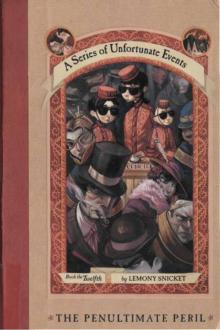 The Penultimate Peril
The Penultimate Peril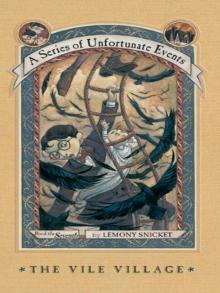 The Vile Village
The Vile Village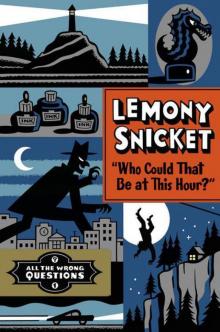 Who Could That Be at This Hour?
Who Could That Be at This Hour?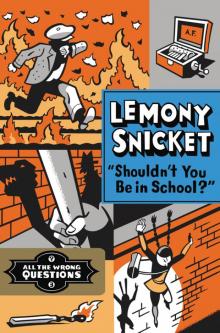 Shouldn't You Be in School?
Shouldn't You Be in School?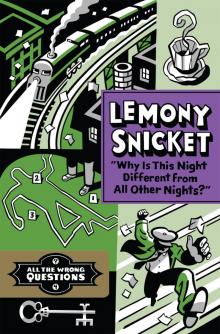 Why Is This Night Different From All Other Nights?
Why Is This Night Different From All Other Nights?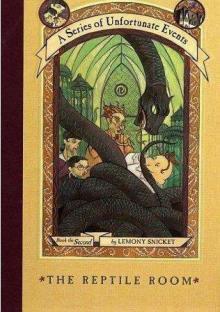 The Reptile Room
The Reptile Room File Under: 13 Suspicious Incidents (1-6)
File Under: 13 Suspicious Incidents (1-6) The End
The End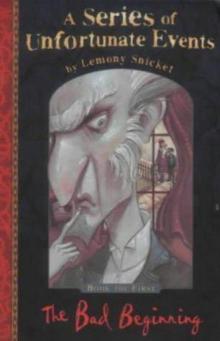 The Bad Beginning
The Bad Beginning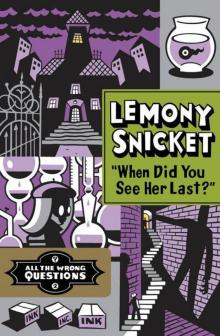 When Did You See Her Last?
When Did You See Her Last?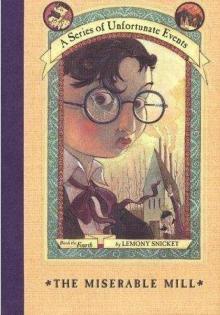 The Miserable Mill
The Miserable Mill The Grim Grotto
The Grim Grotto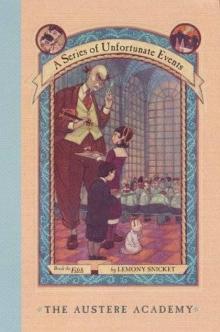 The Austere Academy
The Austere Academy The Ersatz Elevator
The Ersatz Elevator The Wide Window
The Wide Window The Carnivorous Carnival
The Carnivorous Carnival A Series of Unfortunate Events Box: The Complete Wreck
A Series of Unfortunate Events Box: The Complete Wreck The Slippery Slope
The Slippery Slope Read Something Else
Read Something Else The Carnivorous Carnival asoue-9
The Carnivorous Carnival asoue-9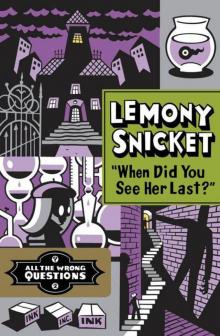 When Did You See Her Last
When Did You See Her Last The Slippery Slope asoue-10
The Slippery Slope asoue-10 The Hostile Hospital asoue-8
The Hostile Hospital asoue-8 A Series of Unfortunate Events Collection: Books 1-13 with Bonus Material
A Series of Unfortunate Events Collection: Books 1-13 with Bonus Material The End asoue-13
The End asoue-13 File Under
File Under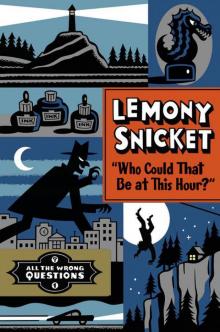 Who Could That Be at This Hour? (All the Wrong Questions)
Who Could That Be at This Hour? (All the Wrong Questions)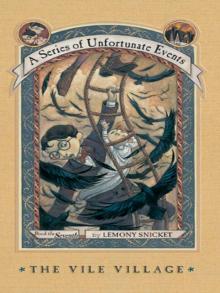 The Vile Village asoue-7
The Vile Village asoue-7 The Grim Grotto asoue-11
The Grim Grotto asoue-11